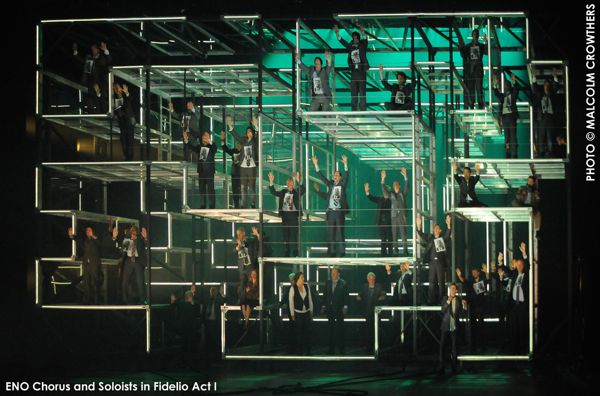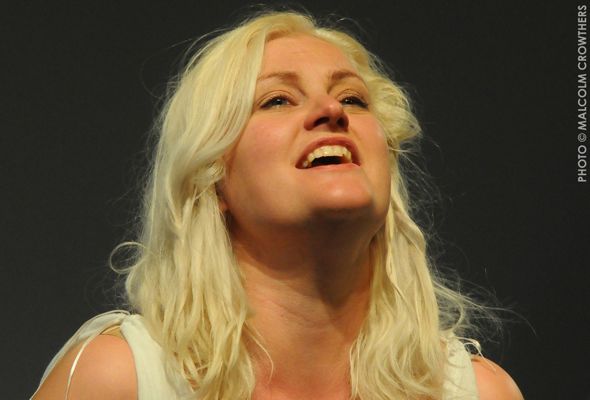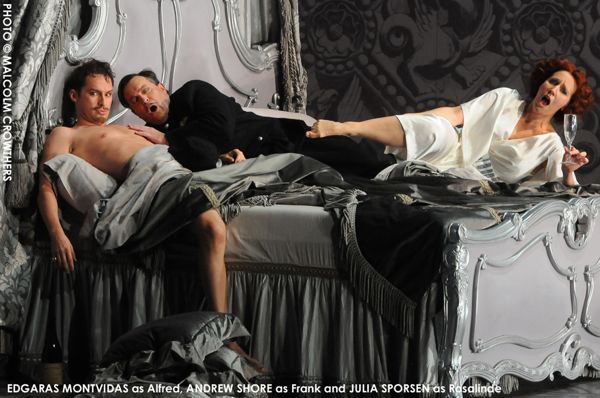 CALIXTO BIEITO’S FIDELIO @ ENO
CALIXTO BIEITO’S FIDELIO @ ENO(11 images shot by M. Crowthers)

Unmissable, Calixto Bieito’s highly original production of Beethoven’s operatic masterpiece Fidelio at ENO is a remarkable experience. If you like those stylish slightly dark films by Almodovar, the Cohen Brothers and Tarantino, you will engage immediately with this Fidelio. It’s a rescue opera, the story of Leonore, who disguises herself as a man, Fidelio, to rescue her political prisoner husband Florestan from his enemy Don Pizarro’s dank dungeon, snatching him from the very jaws of death back into her arms. Famed Catalan director Bieito takes this traditional story and gives it a very modern edge, visually surprising, arresting and stark. In line with ENO’s theatrical almost cinematic approach to a lot of its productions. Bieito, who stunned ENO audiences last year with his sex cars violence lust love & death Carmen, makes Fidelio a gripping prison drama with an astonishing filmic attention to detail. The stunning set by Rebecca Ringst screams INCARCERATION, a towering steel, glass and flashing neon structure of boxes, ladders and platforms filling the full height and breadth of the London Coliseum’s vast stage, immensely imposing especially filled with the great chorus of prisoners in corporate business suits as if at office block windows, suggesting states of captivity in ourselves, far beyond the distant reality of political prisoners in Guantanamo Bay and Abu Ghraib, provoking us to question who we are and how we are all in our own ways prisoners, trapped in the daily patterns of our lives, each in our own box, in our own head. Beethoven knew the terrible solitude of incarceration in his own head caused by deafness. Imagine being a composer of such imagination and not being able to hear a note? Yet such was the condition in which Beethoven led the first performance of the final version of his only opera in 1814 which he had started to write back in 1805, already 4 years after the onset of his deafness at the age of 30. His prison opera was written in the prison of his mind. Reflection is important. The best novels and plays cause us to rethink our lives, and no less should operas and their productions, especially this one by Beethoven the humanist who believed in Liberty and abhorred tyrants, and famously tore up his dedication to Napoleon on his Eroica Symphony when Bonapart declared himself emperor. Beethoven’s message, coined by Rousseau back in 1762, rings loud and clear: “Man is born free, and everywhere he is in chains.” A director who understands the brutalities of man, Bieito has said he no longer believes that justice still exists as a concept in the world, but what he does believe in is the redeeming power of love. He is one of those great directors who have an intellectual and philosophical approach. There are multiple layers of meaning and deep psychological penetration of every character that makes this Fidelio riveting and rewarding to watch. And what of Beethoven’s music? You could not wish for a better performance. Under the baton of ENO’s Director of Music, Edward Gardner, the orchestra, cast and chorus are all superb.The principal singers prove not only skilful at the finely tuned acting Bieito requires of them but at mastering Beethoven’s often exceedingly difficult vocal lines at the same time, an Olympian feat. At best, as in the First Act Quartet, Emma Bell as Fidelio, James Cresswell as the gaoler Rocco, Sarah Tynan as his daughter Marzelline, and Adrian Dwyer as her lover Jaquino, move us to tears. Equally transfixing is Stuart Skelton as the prisoner Florestan’s searing cry from the soul of the word “God” just after the entire set has turned upside down on top of him to trap him in a labyrinthine cage, a breath taking and chilling sight. Supremely moving again is the masterstroke musically of this production. After the climactic moment that Florestan is rescued by his wife Leonore from being killed by the tyrant Pizarro and reunited with her, unearthly music is heard as if from another world, strange quiet music which Beethoven wrote a decade after his opera as thanks to God from a convalescent recovering from a near fatal illness, the slow movement of his String Quartet Op 132. Gradually it comes into focus as the four players of the Heath String Quartet slowly descend in cages, quite visionary and a true still point before the mighty loud and magnificently achieved finale where the ENO chorus surpass themselves and Roland Wood as the Minister Don Fernando steps suddenly out of the 18th century in full English aristocratic dress to bestow justice, or does he? There is another dark surprise up Bieito’s sleeve to unsettle us, and send us home thinking.
 Catharine Rogers in George Lloyd's first opera Iernin
Catharine Rogers in George Lloyd's first opera Iernin
Catharine Rogers is intensely commanding singing the huge title role in George Lloyd's first opera Iernin, a Cornish legend of a fairy doomed by love of a man, who turns to stone rather than live in a world of hate. With her very own elfin Lord of the Rings hair, Catharine Rogers is compellingly fairy-like and particularly thrilling in her mad scene. Written by a young man barely out of his teens, Iernin is a sumptuous opera from the inter war years inspired by Verdi and Donizetti, with a dramatic film score sweep, haunting melodies and rich colourful orchestrations vividly performed by Surrey Opera soloists and chorus conducted by Jonathan Butcher and directed by Alexander Hargreaves. Its first staging since its premiere in 1934, it is a rare opportunity to experience this very English grand opera. Trinity School Theatre, Croydon, Surrey CR9 7AT, Thurs 24 - Sat 26 October, and on 1 & 2 November, St John’s Hall, Penzance, Cornwall TR18 2QR.
http://www.surreyopera.org
 CONSTANCE HOFFMAN'S COSTUME TOUR DE FORCE FLEDERMAUS @ ENO
CONSTANCE HOFFMAN'S COSTUME TOUR DE FORCE FLEDERMAUS @ ENO(10 images shot by M. Crowthers )

Constance Hoffman's costumes are a terrific tour de force, deliciously sassy and fun, with fabulous jewellery and shoes adding excitement, as every chorus member is treated as a character with all their own individual costumes, some hilarious and quite risquee, displaying a tremendous confidence to bring it off, in a thrilling throng at Prince Orlofsky's great and glitsy high-society party which is the centre piece of Die Fledermaus, the world's favourite comic operetta by Waltz King Johann Strauss celebrating the pleasures of hedonism, champagne and partying, brimming over with intrigues, seduction, transgressive sexual desires, infidelities, practical jokes and high spirits, and an endless parade of instantly recognisable famous tunes. The sparkle, fizz and pop are addictive in this new darker than usual production by Olivier Award winning director Christopher Alden. A favourite at the ever adventurous ENO keen to escape from crowd pleasing productions of time worn favourites, Alden imaginatively whips Fledermaus away from Strauss's 1870's Vienna, where Strauss himself conducted the premiere, to plunge it into Art Deco Vienna of the 1920's, with a heady mixture of Freud, dream analysis, romping bedroom farce, fetischism and faschism in which Constance Hoffman excells in her recreations of costumes of the period, and the dramatic set by Allen Moyer is dominated by a gigantic gloriously hung canopy bed and a vast bedroom wall of griffin pattern wallpaper all in silver grey with a thunder bolt split that suddenly opens to let in a burst of golden champagne light. The Bat whose revenge is the lynch pin of the story has a ten foot wing span and in a spectacular moment rides the huge hypnotists' pocket watch that swings above the set. The chorus and cast of soloists give their all revelling with the orchestra and talented young conductor Eun Sun Kim making her ENO debut in Strauss's effervescent music.
























